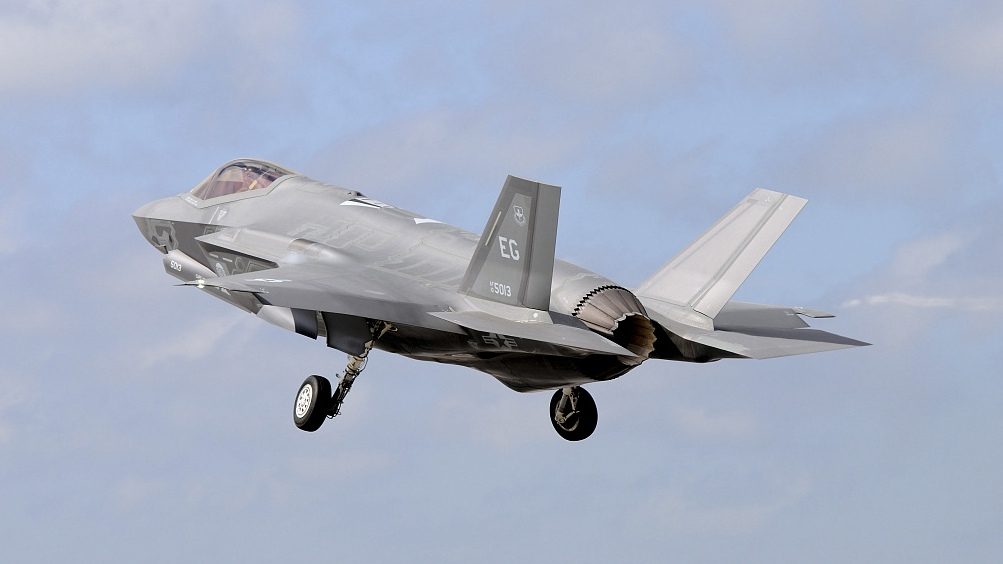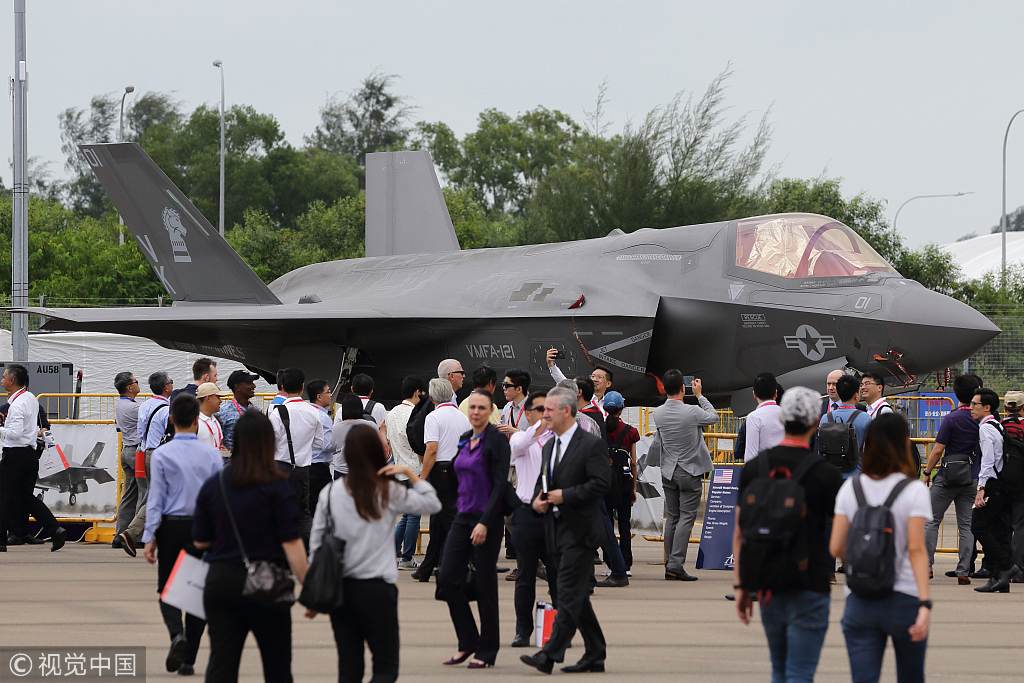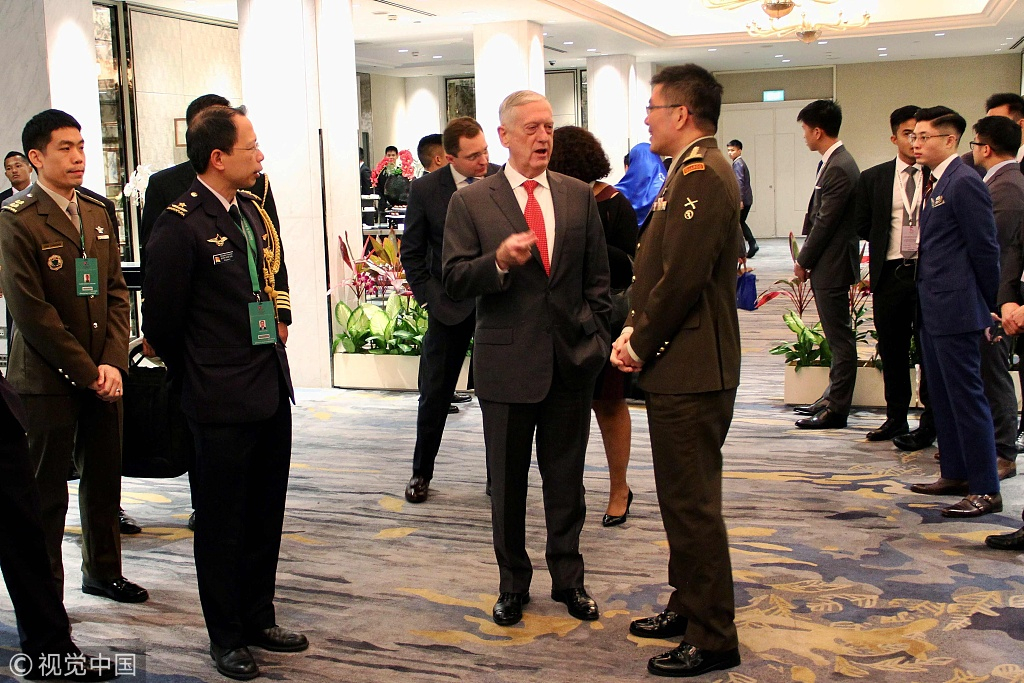
Analysis
21:36, 10-Mar-2019
Is Singapore's purchase of F-35s targeted at China?
Xu Sicong

Trade and commercial disputes have consistently caused disruptions in China-U.S. relations in recent years, but geopolitical rivalry in the South China Sea is another bone of contention between the two big powers that's never far from the surface.
On March 1, the issue came to the fore after Singapore's defense minister Dr Ng Eng Hen announced in Parliament that the country plans to buy up to 12 F-35 stealth jets from the U.S.
Speculation soon followed that such a move is "indicative of growing concerns within Asia regarding China's regional ambitions," with an article on CNN hinting at Singapore's fear of China's "aggressiveness" in the South China Sea. The article also suggested that a deal would further deepen the divide between Beijing and Washington.

A Martin F-35B fighter jet on display during the Singapore Airshow at Changi Exhibition Centre, February 7, 2018, in Singapore. /VCG Photo
A Martin F-35B fighter jet on display during the Singapore Airshow at Changi Exhibition Centre, February 7, 2018, in Singapore. /VCG Photo
However, such a claim is simply a reflection of a common tendency by some to overplay China's security threat and to try to link every change in Southeast Asia security situation with China-U.S. rivalry. Regarding the Singapore purchase, Chinese experts dispute the claim that it is targeted at China or is associated with the South China Sea issue.
They point out that Singapore is not one of the disputing parties in the territorial disputes regarding the South China Sea, which mainly involve Brunei, China, Malaysia, Indonesia, the Philippines and Vietnam. According to Cheng Hanping, senior researcher at the Collaborative Innovation Center of South China Sea Studies, it is a far-fetched idea that this major weapon procurement is a reaction to China's handling of the issue.
Instead, the decision should be examined in the broader context of the country's defense policy, experts advised. As a city-state that has a territory of only 721.5 km² and a population of 5 million people, Singapore actively seeks to build a robust national defense with "its policy placing 'self-defense' at the core," or "deterrence and diplomacy" in the official wording, according to Tang Qifang, an associate research fellow at the China Institute of International Studies.
Its turbulent relations with its neighbors in the past, most notably Malaysia with which Singapore has frequently squabbled over maritime and airspace disputes since its separation from the former in 1965, also weighs heavily in its defense strategy. Therefore, "If anything, this move is more likely to be seen as a deterrence to Malaysia, rather than defiance of China," said Cheng.
Moreover, Singapore's close relationship with the U.S. is nothing new. Traditionally it has been in a strong military alliance with America and hosts one of its overseas navy facilities, even though it has been careful enough not to openly label the relationship as one of allies. Given its lack of land to train troops, Singapore has had to resort to acquiring high-end military weapons, with the U.S as the main supplier. Experts believe that buying F-35s is consistent with the strategy and there is no need to read too much into the decision.

Then U.S. Defence Secretary James Mattis (C) speaks to a Singaporean military official during the Association of Southeast Asian Nations (ASEAN) security summit in Singapore on October 20, 2018.
Then U.S. Defence Secretary James Mattis (C) speaks to a Singaporean military official during the Association of Southeast Asian Nations (ASEAN) security summit in Singapore on October 20, 2018.
Zhou Chenming, a military commentator at Phoenix TV, also said that even though Singapore's real intention behind acquiring such weapons that can initiate offensive attacks have not been crystal clear "as the country has not faced the kind of threat that would make such purchases necessary in recent years," it is better not to jump to conclusions too quickly and "we need more time to find out."
Nevertheless, the experts are wary of some of the possible repercussions of a combat aircraft deal.
According to Zhou, the U.S. wants to beef up its military presence in the South China Sea, and Singapore's purchase may give it opportunities to do so, given the close military cooperation between the two countries.
He added, however, that chances of big clashes between China and the U.S. in the region are slim and the status quo in the region should be maintained in the coming years.
There is also room for potential disruptive effects to the regional security balance. "It will certainly raise some eyebrows among regional countries," Cheng said.
The reason is simple. With its vast economic wealth, the Southeast Asian powerhouse has been able to achieve a military prowess that far outweighs what its size would suggest. For example, Zhou said that Singapore already possesses the best air force and navy in the region and the purchase of F-35 fighter jets which have "advanced situational awareness and mission systems," would be the icing on the cake.
That will cause concern for other regional powers especially Malaysia and Indonesia. "Regional countries may follow suit, potentially exacerbating underlying tensions in the region and triggering an arms race," he said.
(If you want to contribute and have specific expertise, please contact us at opinions@cgtn.com.)

SITEMAP
Copyright © 2018 CGTN. Beijing ICP prepared NO.16065310-3
Copyright © 2018 CGTN. Beijing ICP prepared NO.16065310-3